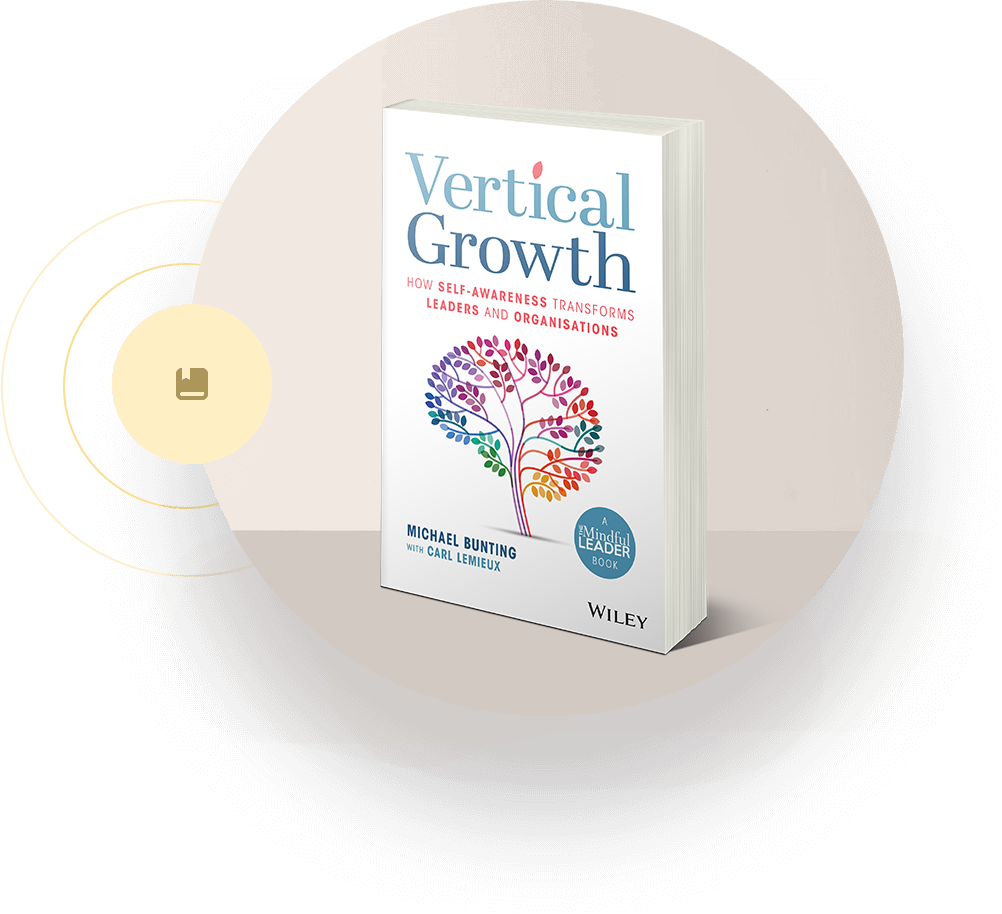In their book The Leadership Challenge, Jim Kouzes and Barry Posner explain that, ‘Leadership begins with a belief in yourself and continues only if other people believe in you.’ To believe in you, people have to know (1) who you are and what you stand for, and (2) whether or not they can trust you. In other words, leaders must walk their talk, and in order to do that, they must have a talk to walk. Values are your talk, and living in accordance with them through your behaviour — what Jim and Barry call ‘modelling the way’ — is your walk.
Values are far more than lofty, intangible ideals. When applied properly, they are living, breathing forces that direct our behaviour. Even deeper, consciously choosing and living values helps us overcome subconscious programming and conditioned responses.
Mimi Huizinga, Senior Vice President and Head of U.S. Oncology Medical at Novartis, explained to me how values wake her up when she sometimes uses numbness to escape from life. ‘Numbness means you’ve built walls, so you’re protecting yourself from agony. But in the process you’re also blocking joy. When I’m numb, the organisational purpose doesn’t energise or motivate me. I often feel like I want to sleep more. Everything is harder when I’m numb. And I’ll often find myself doing unhelpful things to stay in numbness. It’s amazing how many ways I can find to distract myself from doing the real development work.’
The key to pulling herself out of numbness, she realised, is to reconnect with her core value of curiosity. As she put it, ‘When I’m feeling numb, it’s coming from a place of frustration and exhaustion, rather than energising curiosity. I’ve been keeping a lot of feelings at bay. So when I can flip the switch into curiosity, I can reconnect with and explore my feelings, and reconnect with all of life. Through curiosity, I rediscover excitement and joy.’
Bringing values to life
Are your values a living practice? What practices do you use and what actions do you take daily to align with what you stand for? If you have to think about it, then it’s clearly not actually living or operational in your life.
Here are a few questions to help you gauge whether or not you are walking your values talk in your life:
- How did your talk shape your behaviour (walk) over the past week?
- At any point, did you refer to the talk you’re trying to walk in order to modify your behaviour?
- Can you describe a moment in the past two or three weeks when you had to actively work through fear, a loss of approval or a sense of embarrassment in order to walk your talk?
If you struggle to answer these questions — as most leaders do — there’s a good chance that you’re not clear on your ‘talk’ and that you have no aligned development practice or ‘walk’. The result is a loss of trust and credibility among those you lead.
Identifying your core values is key to consciously developing as a leader. Clarifying one’s values typically demands many iterations and requires us to ask at least four fundamental questions:
- What really matters to me? This is a very broad question. In an organisational context, it can be narrowed down to what really matters to me in this organisation or team, or as a leader.
- What is life asking of me? This question allows us to get outside our ego structure and let the more intuitive part of our self express itself.
- Why is this important to me now? It allows us to start homing in on what we practically wish to focus on in the present moment while anchored in a purposeful life.
- Where is my life not working and what value/s could I adopt to help me grow and deal with this more constructively? This helps us consider values from a growth perspective.
The most important leadership values
Obviously, you consciously choose the most important values to follow. To help you explore these values, it can be useful to examine the extensive research demonstrating which values best impact leadership effectiveness. The world’s most popular leadership assessment tool is Kouzes and Posner’s Leadership Practices Inventory, their 360° assessment. Their research shows that among the 30 statements by which they measure leadership, a lower than average score on ‘Treats people with dignity and respect’ has the most detrimental impact on leadership trust and credibility.
Essentially, this means that if we don’t treat people with dignity and respect, we disqualify ourselves from being exceptionally good leaders. We also destroy any possibility of psychological safety, which is a prerequisite for high-performing, healthy teams with a growth mindset.
The good news is that when we are mindful, feeling safe and present, treating others with dignity and respect is only natural. In reality, however, our shadow and the triggers in our increasingly challenging lives can move us away from these values, hence the need to make them explicit.
Kouzes and Posner conducted further research around the question, ‘What do we most admire in leaders?’ What qualities in leaders make us most willing to follow them? What characteristics do leaders need to be credible? A massive survey identified 225 leadership values and characteristics, which Kouzes and Posner refined to a top 20. They then conducted a survey six times over a 30-year time span in which they asked the more than 100 000 participants to choose the characteristics they most admired and were willing to follow in leaders.
The table below abridges the results of the most recent study, completed in 2017.
Characteristics of admired leaders
| Norms | Characteristic | Norms | Characteristic |
| 28 | ambitious | 84 | honest |
| 40 | broad-minded | 17 | imaginative |
| 23 | caring | 5 | independent |
| 66 | competent | 66 | inspiring |
| 31 | cooperative | 47 | intelligent |
| 22 | courageous | 18 | loyal |
| 39 | dependable | 17 | mature |
| 22 | determined | 10 | self-controlled |
| 35 | fair-minded | 32 | straightforward |
| 62 | forward-looking | 37 | supportive |
© The Mindful Leader
As you can see, four qualities stand out from the rest, the highest being honesty, followed by inspiring, competent and forward-looking.
Therefore, the two most important qualities for leaders to develop are respect and honesty. Unfortunately, leaders often don’t live up to these values. The research firm Willis Towers Watson surveyed 32 000 people in 26 markets and asked them to respond to three statements. Here is what they discovered:
Do we trust our leaders?
| Statement assessed | Agree (%) |
| Senior leadership behaves consistently with the organisation’s core values. | 56 |
| I believe the information that I receive from senior leadership. | 54 |
| My immediate manager acts in ways consistent with his or her words. | 57 |
Source: adapted from Willis Towers Watson, GWS Global Report 2016.
Another research study performed by DataPad involving 2100 respondents in the UK gauged how much employees trusted their leaders. The survey asked employees the same question on ‘trust’ and ‘respect’ in relation to their executive leadership, heads of department and immediate line managers: 999 people responded to the question on their CEOs; 1264 responded to the question on their immediate managers. Of those who responded to the question ‘Do you trust and respect your CEO?’, 30 per cent responded ‘not at all’ and another 39 per cent responded ‘a little’. Immediate managers were trusted ‘a lot’ by only 48 per cent of those who responded and ‘a little’ by 36 per cent; 16 per cent of immediate managers were not trusted at all.
Honesty as a foundational value to a growth mindset
Honesty refers to being honest with both ourselves and others. Honesty towards ourselves means we are committed to taking full accountability for our thoughts, emotions and actions. We are willing to be curious about what is happening inside ourselves, and to compassionately tell ourselves the unalloyed truth about what is going on and what our intentions are. It’s a commitment to uncovering the truth, even if it’s inconvenient or uncomfortable, and it’s fundamental to growth.
Honesty towards others is also a challenging practice for all of us. We often don’t give honest feedback, for example because we’re afraid of ruining relationships or disengaging people. However, research from leadership experts Jack Zenger and Joseph Folkman shows that the more honest feedback a leader gives to their people, the more engaged they will be.
There is so much more to honesty than telling the truth: there is a depth of self-awareness and realness that is profoundly rewarding. Not only do we want honesty from our leaders, but it’s also something we all long for ourselves. This is the deepest definition for an ‘authentic’, no-bullshit leader. A leader we can trust not because they are perfect, but because they are authentic. They are not defending their flaws or hiding from you or themselves in their shadow. They can hear you, be real, be connected. And in doing so, they give you full permission to be human too. This is the heart of the deep, alive connection we all long for.








